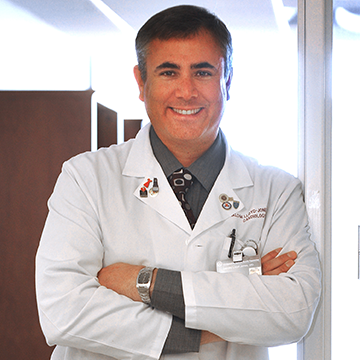Your Ideal Heart Health with Donald Lloyd-Jones, MD, ScM
Donald Lloyd-Jones, MD, ScM, was named physician of the year in 2017 by the American Heart Association. Through his research and practice as a preventive cardiologist at Northwestern, Lloyd-Jones is chasing a big goal: to improve and preserve the heart health of Americans, one patient at a time.

"We talk completely appropriately about the public health emergency that the opioid epidemic represents, but the true public health problem facing this nation for the next many decades is the obesity epidemic. This is an epidemic that we've never seen in human history, and it's unfolding right here in this country."
-
Senior Associate Dean for Clinical and Translational Research
-
Chair, Department of Preventive Medicine
-
Director, Northwestern University Clinical and Translational Sciences Institute
-
Eileen M. Foell Professor
- Preventive Cardiologist at Northwestern Medicine
Episode Summary
In 2017, Donald Lloyd-Jones, MD, ScM, joined a small circle of celebrated physicians who over the years have been named Physician of the Year by the American Heart Association.
Donald Lloyd-Jones: "It was an amazing moment. My wife was there with me and a lot of people I respect, and to be honored in that way by an organization that is really changing the health of Americans in a very positive way was one of the highlights of my life."
Over the past decade, Lloyd-Jones has played an instrumental role in helping the American Heart Association educate Americans about how to achieve ideal cardiovascular health. His passion for understanding and preventing cardiovascular disease began early in his training as a physician-scientist. Lloyd-Jones worked on the Framingham Heart Study, a famous and ongoing study that made major contributions to the understanding of cardiovascular disease and its risk factors. When he came to Northwestern 15 years ago, he continued to lead other population-based studies and has developed models to help predict who may experience cardiovascular disease in their lifetime.
Donald Lloyd-Jones: "However, prediction is like being a weatherman. People want to know is it going to rain or is it not, will they have a stroke or not? We can provide probabilities. We can kind of put someone in a bucket to say: 'Yeah, you're in a high-risk group.' Or, 'You know, as things are today, you're in a very low-risk group. Keep it up; good work.' But we need extra tools to help refine decision-making for people who are kind of in the middle, in the gray group. And I think that's where some of our research can inform clinical practice guidelines to help patients and doctors make better decisions."
Through his work with the American Heart Association and the American College of Cardiology, Lloyd-Jones has been involved in all of the major prevention guidelines for cardiovascular disease put forth in the past decade. He recently published a paper in JAMA that assessed cardiovascular risk in people under the age of 40 using new 2017 guidelines that lowered the clinical definition for elevated blood pressure and hypertension. The findings suggest that the new blood pressure guidelines may indeed help identify young adults at higher risk for cardiovascular events and who may benefit from lifestyle modifications or, in more serious cases of hypertension, drug therapy.
Donald Lloyd-Jones: "I think the purpose of guidelines is to put out there what we understand, based on today's evidence, what is best practice. And then if the system works, scientists poke and prod and they push and they do new studies to say, 'Does that really hold up?'"
As Lloyd-Jones continues his work as a physician-scientist and a leader in the field of preventive cardiology, he says addressing America's obesity epidemic is of great importance.
Donald Lloyd-Jones: "You know, we talk completely appropriately about the public health emergency that the opioid epidemic represents, but the true public health problem facing this nation for the next many decades is the obesity epidemic. This is an epidemic that we've never seen in human history, and it's unfolding right here in this country. We're the most obese and overweight nation in the world in history. Since 1985, we've gone from fewer than 10 percent of Americans being obese now to more than 35 percent being obese and another 40 percent being overweight."
Even a reduction of 10 to 20 percent of an overweight or obese person's body weight can improve their cardiovascular health dramatically, he says.
Subscribe to Feinberg School of Medicine podcasts here:
Continuing Medical Education Credit
Physicians who listen to this podcast may claim continuing medical education credit after listening to an episode of this program.
Target Audience
Academic/Research, Multiple specialties
Learning Objectives
At the conclusion of this activity, participants will be able to:
- Identify the research interests and initiatives of Feinberg faculty.
- Discuss new updates in clinical and translational research.
Accreditation Statement
The Northwestern University Feinberg School of Medicine is accredited by the Accreditation Council for Continuing Medical Education (ACCME) to provide continuing medical education for physicians.
Credit Designation Statement
The Northwestern University Feinberg School of Medicine designates this Enduring Material for a maximum of 0.5 AMA PRA Category 1 Credit(s)™. Physicians should claim only the credit commensurate with the extent of their participation in the activity.
Disclosure Statement
Donald Lloyd-Jones, MD, ScM, has nothing to disclose. Course director, Robert Rosa, MD, has nothing disclosure. Planning committee member, Erin Spain, has nothing to disclose. Feinberg School of Medicine's CME Leadership and Staff have nothing to disclose: Clara J. Schroedl, MD, Medical Director of CME, Sheryl Corey, Manager of CME, Jennifer Banys, Senior Program Administrator, Allison McCollum, Senior Program Coordinator, and Rhea Alexis Banks, Administrative Assistant 2.